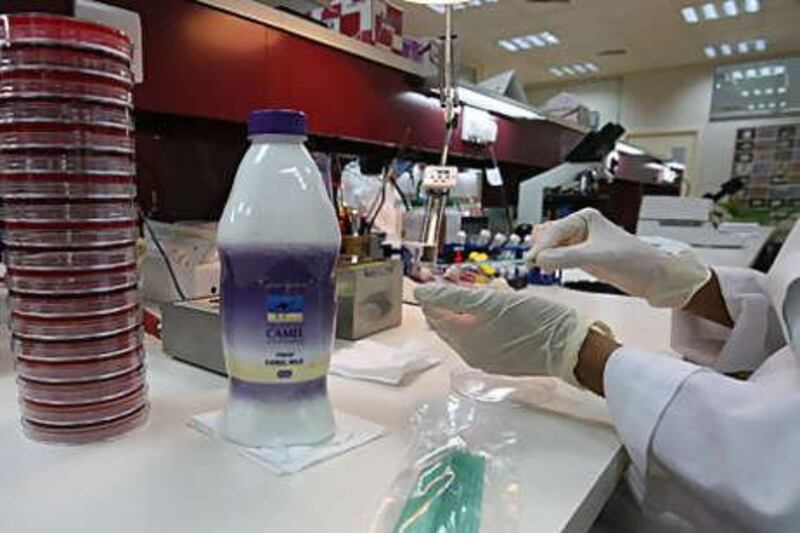Convincing European consumers to start filling their fridges with camel's milk will require a lot more production, and an extensive marketing campaign to brand the traditionally Middle Eastern beverage as a healthy alternative to cow's milk. For camel's milk to take its place on European supermarket shelves, UAE farmers will have to churn out a lot more of it, and create a sleek, health-focused brand, industry analysts say.
The Ministry of Environment and Water announced this week that it was one step closer to gaining approval for camel's milk to be exported in Europe. But supermarket chains say their customers have little knowledge of the product. "We always listen to the needs of our customers," said a spokesman for the British chain Sainsbury's, "but as we feel there is no great demand for camel's milk in the UK, we will not be stocking it."
Tesco, another British-based supermarket chain, said it was not interested in camel's milk. If that is to change, Dubai-based Central Veterinary Research Laboratory (CVRL) and its partner, Emirates Industry for Camel Milk and Products, will have to create a modern, health-focused brand to attract European consumers. "The packaging will have to be clean, healthy and fresh, and you'll have to [remove] the image of a camel from consumers minds," said Sven Mostegi, a food consultant based in Dubai. "Camel milk will need to get on the health train."
The raw material is promising. Camel's milk is close in composition to human milk and loaded with vitamins B and C. It has half the fat of cow's milk, little lactose and is a probiotic. The milk is believed to help in controlling diabetes due to a high concentration of an insulin-like protein. There are also claims it can ease food allergies. According to Dr Mostegi, if camel's milk is sold as a health food, and introduced to the right markets in Britain, Germany and Holland, it could succeed in gaining the attention of Europe's food industry.
"This is where the international public are open to trying new things. Everyone looks to the United Kingdom - food and drink trends start there and spread out." However, any health claims will have to be carefully pitched. While the CRVL has been researching the benefits of camel's milk for years, it will have to submit its findings to the European Food Safety Authority after a recent clampdown on health food labelling.
Some stores did voice hesitant interest. Real, a German hypermarket, said the milk could be an option for consumers who could not digest cow's milk, but were concerned over price and availability. "With more than one million customers each day we would need a reliable quantity," said Markus Jablonski, a spokesman for Real. "If camel's milk is really suitable for people who are suffering from lactose intolerance, it could be an interesting alternative beside other already existing products, such as those based on soya."
Availability remains an issue even in the Emirates, where the country's two producers of camel's milk, Al Ain Dairy and Emirates Industry, struggle to keep up with domestic demand. Emirates Industry produces 5,000 litres of camel's milk a day. According to Shiraz Chikhaoui, Al Ain Dairy's marketing director, the company is not considering exporting its camel's milk brand, Camelait. Dr Ulrich Wernery, the scientific director of the CVRL, was unsure what quantity would be available for export in the future. He added that Emirates Industry would have to open a second farm to increase production of its brand, Camelicious.
While Dr Wernery estimated that it could be around four times the price of cow's milk in Europe. Still, health food stores were not put off. "If it becomes mainstream, people would consider it," said Claire Bateman, the owner of Dandelion Natural Foods in London. "Cost wouldn't particularly affect things, it's more to do with having an option, particularly for babies that can't have normal milk. It's really to do with digestibility."
Yesterday, a one-litre bottle of camel's milk was priced at Dh9 in the UAE, compared to Dh5.50 for a one-litre bottle of Al Ain Dairy cow's milk. mdetrie@thenational.ae





